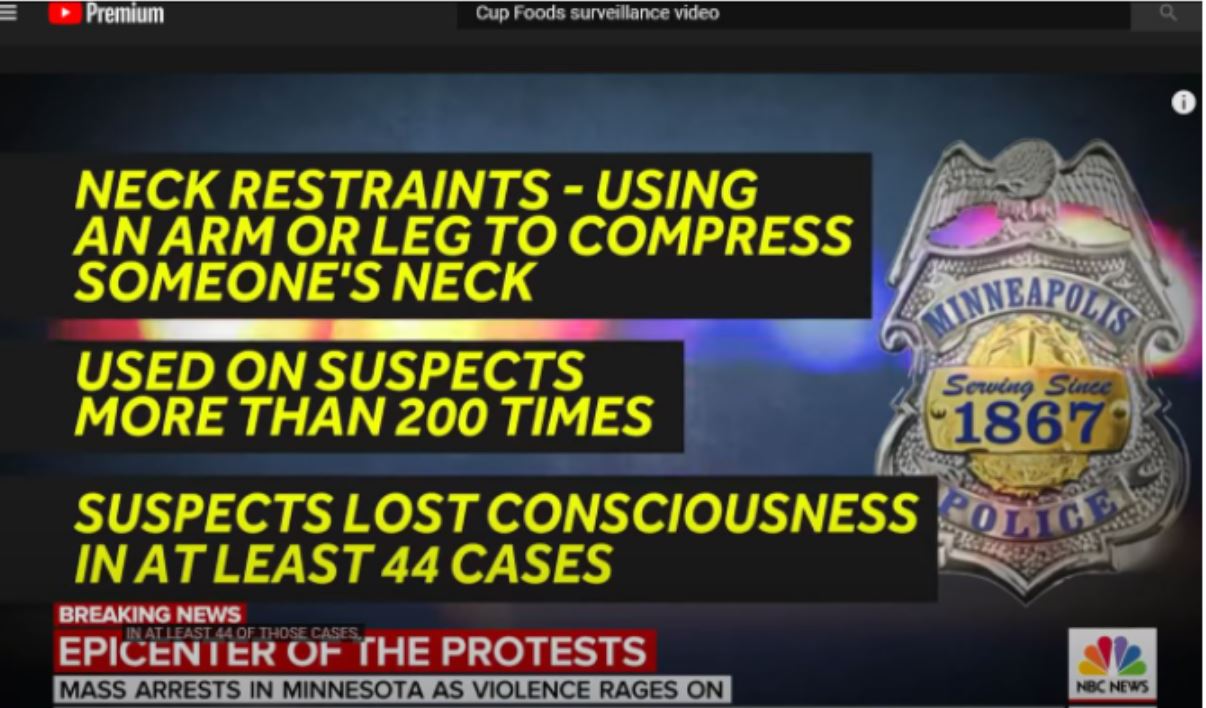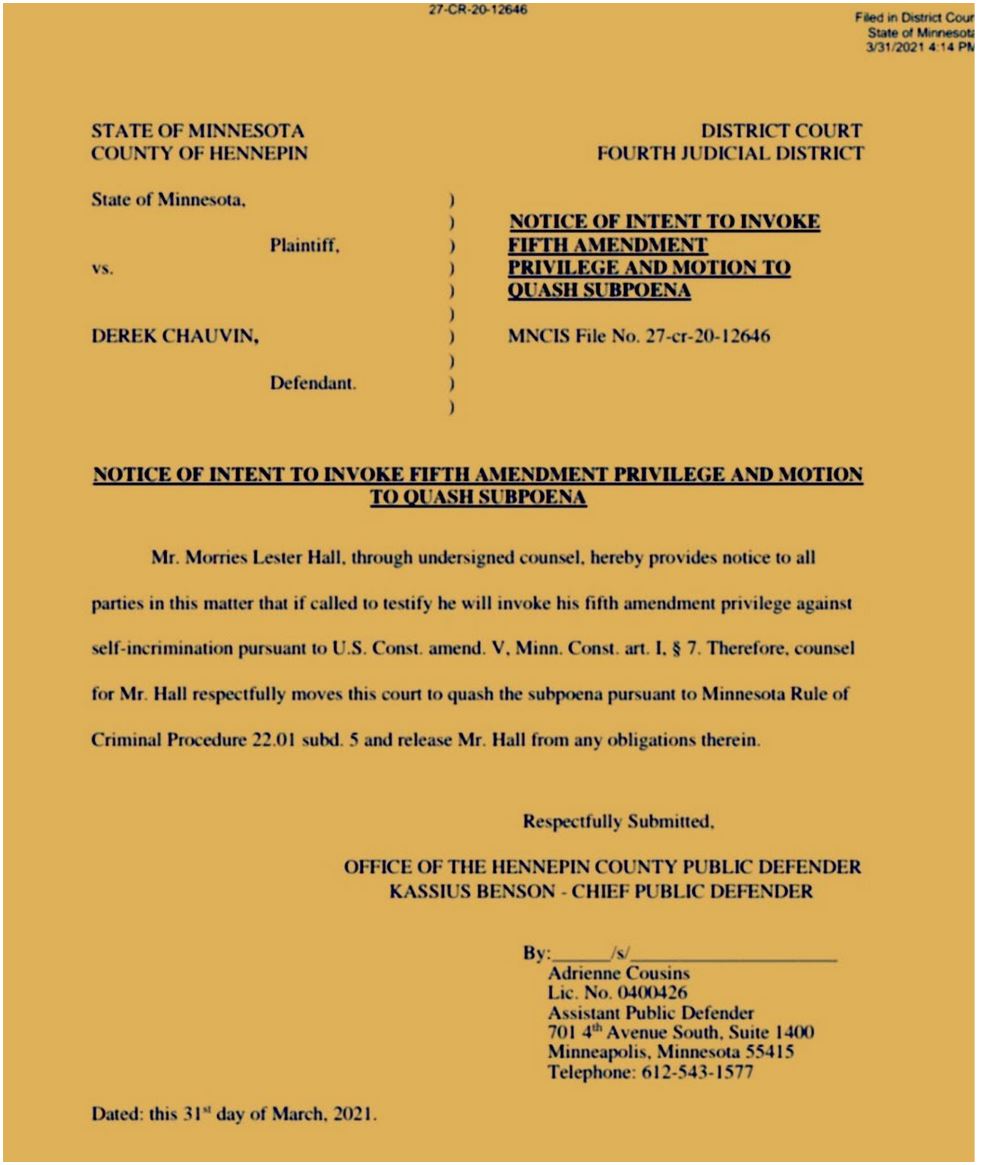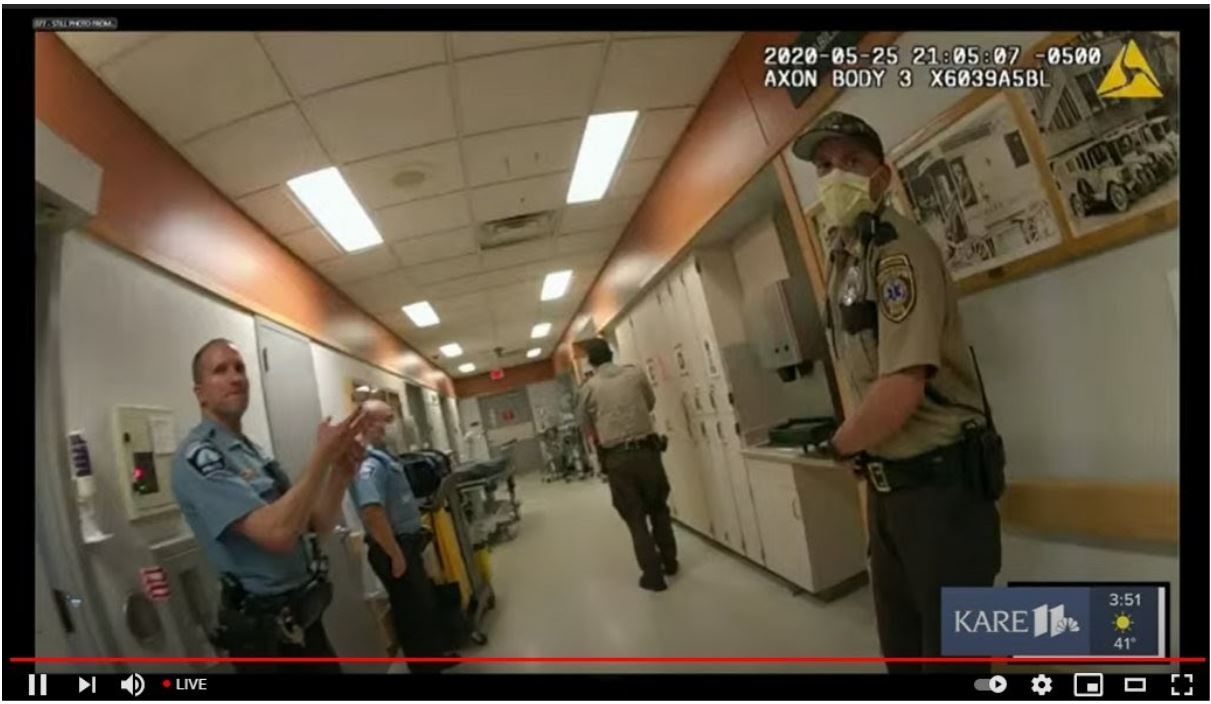After another morning of tears and trauma, the court moved on to hear from paramedics, firefighters, and those who have worked with the Minneapolis Police Department. This after George Floyd’s girlfriend said that her fiance was in the hospital two months before his death for taking bad pills purchased illegally.
Ross’s testimony came across as earnest and her admittance — kept on record despite the state’s objection — arguably helps Derek Chauvin since his defense argues Floyd died of an overdose from swallowing drugs in an effort to hide them. You could argue that doing something like this after hospitalization and a near overdose a few months prior is foolish and desperate.
Please follow Maryam Henein on Twitter
You can support her work on Patreon
Follow Maryam on Telegram and Gab
As the trial moves on, questions continue to arise about whether this is truly a violent act of racial hate. A murder for hire has also been posited. Derek and George worked on the same nights at the same club. Why hasn’t this been mentioned as of yet? And Officer Alexander Kueng is black. Meanwhile, MN has a problem with counterfeit bills and counterfeit pills. This also hasn’t been mentioned.
What truly led to the events that unfolded at the intersection of Chicago and 38th?
On Thursday, the public also got to hear Chauvin on his body-worn camera, which conveniently fell off his person and under the front of the squad car. He can be heard telling a bystander that Floyd was a sizeable guy.
Meanwhile, Morries Lester Hall who was going to be a central witness for the state is pleading the fifth and asking his subpoena to be quashed. This is incredulous. This guy was also seen with suspected counterfeit bills and arguably selling pills to Floyd. He’d sold him pills before, said Ross.
He provided a false name to officers at the scene of Floyd’s arrest, which is why the press may be calling him “Maurice.” After the incident, he fled back to Houston. Hall, 42, was arrested on outstanding warrants felony possession of a firearm, felony domestic assault & felony drug possession in Houston and was interviewed by Minnesota state investigators.
Why is he free? Couldn’t you argue he lent to Floyd’s death?
Floyd had high levels of fentanyl and methamphetamine in his system, according to NMS, an independent lab that ran a toxicology report. The drug use possibly contributed to the death, along with a history of heart disease.
There are three weeks to go and it seems the information withheld that is coming out weakens the prosecution. Will Chauvin be acquitted or get a minimal sentence? According to comments via social media, there are already supporters of BLM that say if justice for Floyd isn’t met to their standards, expect more fires. “Just sayin’” one woman says in a short video on Tik Tok. Listen for yourself.
Meanwhile, the state presented firefighters, paramedics, and police officers as they continue to place building blocks that hint at Chauvin’s guilt.
Here are highlights from the remainder of Day 4.
Seth Bravinder
Seth Bravinder, a paramedic with Hennepin EMS responded to Floyd’s arrest and drove the ambulance that day. He said that the initial call (not exactly clear from whom) reported that Floyd suffered a mouth injury and it was a code two, meaning no lights and sirens and low urgency. A minute later, he said the situation was “upgraded” and they rushed to the scene to find “multiple officers on the side of the road with our patient laying on the ground next to a squad car.”
If there was intentional harm then why did the officers summon paramedics? Consider that Chauvin, 5’9, is heard saying that “Floyd is a sizeable guy.”
Bravinder described Floyd as “limp” at the time when they placed him on the gurney, and that he was treated inside the ambulance.
Bravinder hinted that Floyd died way before they reached the hospital. The defense didn’t like that fact, apparently, but Cahill overruled the objection.
Bravinder relayed that when paramedics finally arrived at the scene, Chauvin had to be instructed to get off Floyd. Floyd had no pulse and Bravinder “didn’t see any breathing or movement” from Floyd, prompting his partner to check his pulse.
It is unclear why Floyd wasn’t pronounced as DOA. I was told only a doctor can pronounce this. I haven’t confirmed this assertion and Floyd’s patient records are confidential.
He added that because they were surrounded by “upset” bystanders—which can be “taxing” for paramedics who need “mental power and focus”—the pair drove a few blocks away from the scene before attempting to resuscitate him. Seems a bit strange when it’s a “race for time” as one early article wrote.
This helped Nelson’s argument given he’s stated bystanders were hostile and disruptive.
“Have you arrived at a scene where you’ve seen officers on top of a person before?” Nelson asked.
“Yes,” said Bravinder.
“Objection your honor, irrelevant,” Assistant Attorney General Erin Eldridge said.
Overruled by Cahill.
Inside, the cardiac monitor showed Floyd had “flatlined” and his heart wasn’t pumping blood.
“It’s not a good sign for a successful resuscitation,” he said.
Nelson’s questions focused on EMS policy to have police respond to overdose medical calls. He then asked if people who are revived can become aggressive and violent.
Eldridge objects. Cahill overruled again.
Paramedic Derek Smith
The next witness, Paramedic Smith, said he was the one who used a key to remove the handcuffs from Floyd. Smith says George’s eyes were wide and dilated, which isn’t indicative of an opioid overdose.
Smith described what he saw when he arrived on the scene, besides Floyd and the police officers.
“Lots of there’s multiple people, multiple cell phones out, there were elevated tones used, it didn’t feel like a welcoming environment.”
It was Smith who administered an electric shock to Floyd to try to restart his heart.
“As a human being, I was trying to give him a second chance at life.”
Sgt David Pleoger
Retired MPD Sgt David Pleoger took the stand. He was the person the 911 operator dispatcher called after seeing the officers holding down George Floyd.
Sgt Pleoger has known Derek since 2008 and testified about MPD’s use of force & Maximal Restraint Technique & getting subjects into a side recovery position.
Sgt Pleoger made a cell phone call to Chauvin after the arrest. Only a part of the call is captured on Chauvin’s body camera before he shut it off. It’s hard to hear but it sounds like Chauvin said he had to “hold someone down, he was going crazy.”
In that call, Chauvin also appears to say, “he (Floyd) wouldn’t go back in the squad.”
Sgt Pleoger is also heard telling Chauvin to go find some witnesses after Floyd has been loaded in an ambulance. Chauvin tells him the witnesses are “pretty hostile.”
Pleoger tells him to do it anyway.
Sgt Pleoger described the rest of the call after the body cam shut down. He recalled Chauvin describing a “combative” subject who injured his nose or mouth & “suffered a medical emergency.”
Officer Lane and Kueng also told Sgt. Pleoger their rendition of what happened. He said he told officers Lane and Kueng to gather witnesses at 38th and Chicago, which seems like an odd request and an invitation for more hostility.
After that, Pleoger went down to HCMC hospital to check on Floyd’s condition.
Next, we learned for the first time that Chauvin and Thao actually visited the hospital too. They are seen here at 9:05 pm where, meanwhile, they were still trying to work on Floyd.
So he was not dead at the scene? And why would the officer go to the hospital as a racist killer?
Sgt Pleoger says it was here where Chauvin admitted he knelt on Floyd’s neck, or otherwise used force.
It was around here that the jury was sent out so either side could argue whether the prosecution can ask Sgt. Pleoger his opinion on the use of force.
When should restraint have ended, the prosecution asked.
“When Mr. Floyd was no longer offering up any resistance to the officers, they could have ended their restraint,” Derek Chauvin’s former supervisor, testified.
That’s after he was handcuffed and on the ground and no longer resisting?
“Correct.”
Nelson also asked whether he’s ever run into a scenario where an officer is planning to use the hobble device — but then decides against it because EMS is on the way — does that happen?
Here Nelson suggests that using a device could have further delayed medical attention because of the time it takes to remove the device.
MFD Capt Jeremy Norton
At end of the direct exam testimony from MFD Capt Jeremy Norton from Station #17, he confirmed that he alerted the Fire Department administration about the incident outside Cup Foods. He said Floyd likely died in police custody based on what fellow firefighter Genevieve Hansen had witnessed.
“I was able to infer or put together what she had been talking about… I understood the justification of her duress.”
The use of excessive force will continue to be explored.
Become a Patron!
Or support us at SubscribeStar
Donate cryptocurrency HERE
Subscribe to Activist Post for truth, peace, and freedom news. Follow us on Telegram, SoMee, HIVE, Flote, Minds, MeWe, Twitter, Gab and Ruqqus.
Provide, Protect and Profit from what’s coming! Get a free issue of Counter Markets today.






Be the first to comment on "Day 4 Derek Chauvin Murder Trial — Paramedic Thought George Floyd Was Already Dead"